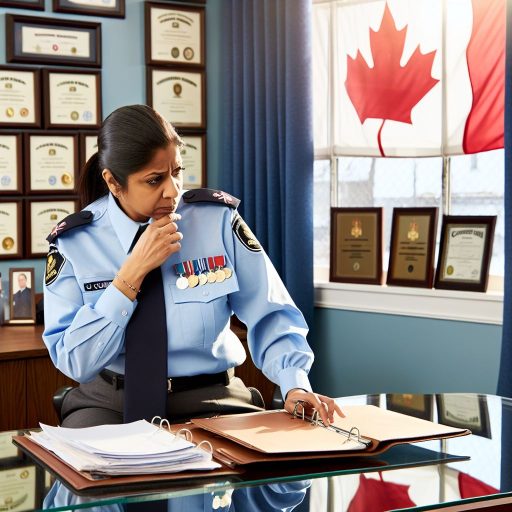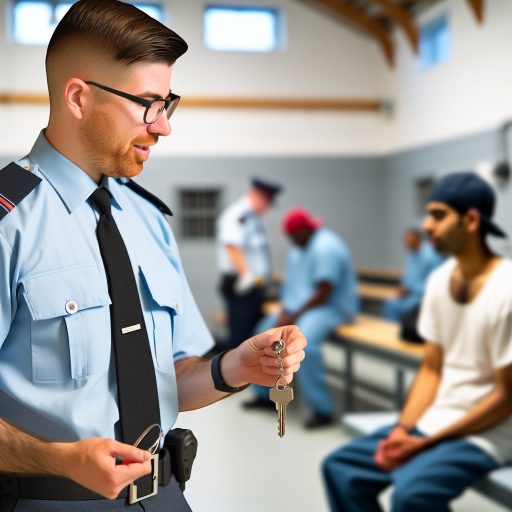Strong Communication Skills
Importance of Clear Verbal Communication
Effective communication is vital for correctional officers.
Clear verbal skills help in daily interactions with inmates.
Officers must convey instructions with precision and clarity.
Moreover, miscommunication can lead to misunderstandings.
This enhances the safety of both officers and inmates.
Significance of Written Communication
Written communication also plays a crucial role in corrections.
Accurate documentation is essential for reports and logs.
Officers often need to write incident reports promptly.
Clear writing ensures that information is conveyed correctly.
This documentation can be critical in legal situations.
Building Relationships Through Communication
Strong communication fosters positive relationships.
Officers should establish trust with inmates through dialogue.
Engaging in conversation allows for better conflict resolution.
Additionally, good communication helps in assessing inmate behavior.
This can prevent issues before they escalate.
Training and Development
Continuous training in communication skills is essential.
Workshops can enhance verbal and written skills for officers.
Role-playing scenarios can prepare officers for real situations.
Regular feedback also helps officers improve their communication.
This commitment leads to better outcomes within facilities.
Emotional Intelligence
Understanding Personal Emotions
Successful correctional officers possess high emotional intelligence.
They proactively recognize and understand their own emotions.
This self-awareness helps them manage stress effectively.
Additionally, it supports decision-making in challenging situations.
Moreover, they can stay calm during confrontational encounters.
Unlock Your Career Potential
Visualize a clear path to success with our tailored Career Consulting service. Personalized insights in just 1-3 days.
Get StartedRecognizing Others’ Feelings
Furthermore, they excel at interpreting the emotions of others.
This skill aids in de-escalating potential conflicts quickly.
Correctional officers often encounter individuals in distress.
Being empathetic allows for better communication and trust.
They can provide support and guidance when needed.
Building Relationships
Strong emotional intelligence fosters positive relationships.
Officers develop rapport with inmates, improving facility dynamics.
Trust leads to cooperation and adherence to rules.
Consequently, safety for both staff and inmates increases.
Building relationships enhances the overall environment.
Adapting to Situations
Officers must adapt their emotional responses to various situations.
This flexibility can prevent unnecessary escalation of issues.
Moreover, they employ appropriate responses depending on context.
This adaptability contributes to effective conflict resolution.
Ultimately, it leads to a healthier workplace atmosphere.
Physical Fitness
Importance of Physical Fitness
Physical fitness is crucial for correctional officers.
It enables them to handle demanding situations effectively.
Officers often face physically challenging tasks daily.
Moreover, it contributes to their overall well-being.
Maintaining a Good Level of Physical Health
Regular exercise is essential for correctional officers.
It helps build strength and endurance over time.
Additionally, officers should focus on cardio workouts.
These workouts improve stamina for long hours on duty.
Nutritional Guidelines
Nutrition plays a vital role in physical fitness.
Officers should consume a balanced diet.
A diet rich in fruits and vegetables is ideal.
Moreover, staying hydrated is essential for optimal performance.
Benefits of Being Physically Fit
Physical fitness offers numerous benefits to officers.
It enhances their ability to respond to emergencies.
Additionally, it reduces stress and anxiety levels.
Furthermore, fit officers are less prone to injuries.
Staying Motivated
Maintaining fitness can be challenging.
Officers should set realistic fitness goals.
Joining a workout group or team can be motivating.
Tracking progress also helps maintain accountability.
Gain More Insights: Day in the Life of a Canadian Border Services Officer
Conflict Resolution Abilities
Importance of Conflict Resolution
Conflict resolution is vital in correctional environments.
Successful officers manage disputes effectively.
This skill reduces violence and enhances safety.
Furthermore, it fosters a positive atmosphere.
Skills Necessary for De-escalation
Officers must possess strong communication skills.
Active listening plays a crucial role in understanding issues.
Additionally, clear verbal communication helps convey authority.
Non-verbal cues also significantly impact interactions.
Empathy and Understanding
Empathy allows correctional officers to connect with inmates.
Understanding various perspectives aids in resolving conflicts.
Moreover, showing compassion often de-escalates tense situations.
Problem-Solving Skills
Effective conflict resolution requires strong problem-solving abilities.
Officers assess situations quickly and accurately.
They must brainstorm solutions that accommodate emotional needs.
Moreover, implementing these solutions encourages cooperation.
Training and Development
Proper training enhances conflict resolution skills.
Role-playing exercises simulate real-life scenarios.
Additionally, workshops can teach effective communication techniques.
Regular feedback helps officers improve their skills over time.
Building Trust and Rapport
Building trust is essential for conflict management.
Officers should develop rapport with inmates regularly.
This connection often leads to reduced confrontations.
Trust encourages open communication, further preventing conflicts.
See Related Content: How Ombudsmen Uphold Rights and Justice in Canada
Decision-Making Skills
Successful correctional officers excel in decision-making skills.
This skill is crucial due to the high-pressure nature of their work.
Officers encounter unpredictable situations that demand quick responses.
They must assess circumstances swiftly and accurately.
Moreover, their decisions can impact the safety of others.
Importance of Rational Thinking
Rational thinking enhances their ability to remain calm.
It also helps in evaluating options effectively.
Officers should prioritize the safety of inmates and staff alike.
They often need to balance competing interests.
Quick Decision-Making Under Stress
Quick decision-making is essential in crisis situations.
During emergencies, hesitation can lead to dangerous outcomes.
Training programs often simulate real-life scenarios.
These simulations prepare officers for urgent situations.
Utilizing Available Resources
Effective decision-making involves utilizing available resources.
Officers should gather information quickly from various sources.
Communication with colleagues is vital during crises.
They need to coordinate with support teams for optimal results.
Delve into the Subject: How to Prepare for a Veterans Affairs Officer Interview

Integrity and Ethical Judgment
Upholding High Ethical Standards
Successful correctional officers prioritize ethical conduct in all circumstances.
They serve as role models for inmates and their colleagues.
Additionally, they consistently demonstrate fairness and justice.
This integrity fosters trust within the correctional environment.
Moreover, ethical decision-making is crucial in high-pressure situations.
Exercising Ethical Judgment
Correctional officers face numerous ethical dilemmas daily.
They must assess situations quickly and accurately.
Their choices can significantly impact inmates’ lives and institutional safety.
Thus, sound judgment is essential to navigate these complexities.
Officers should reflect on their values when making decisions.
Building a Culture of Integrity
Creating a culture of integrity begins with leadership.
Leaders must model ethical behavior for their teams.
They should encourage open dialogue about ethical practices.
Regular training can reinforce the importance of ethics in corrections.
Recognizing and Reporting Ethical Violations
It is vital for correctional officers to recognize unethical behavior.
They must feel empowered to report any violations without fear.
This commitment to accountability promotes a safer environment.
Furthermore, addressing unethical behavior maintains the institution’s integrity.
See Related Content: How Ombudsmen Facilitate Fairness in Disputes
Teamwork and Collaboration
The Importance of Teamwork
Teamwork is essential in correctional facilities.
Correctional officers work in high-pressure environments.
They rely on each other for support and safety.
This collaboration builds trust among team members.
Ultimately, it improves the safety of both staff and inmates.
Effective Communication
Clear communication is vital in any team setting.
Correctional officers must share information accurately.
They should express concerns without hesitation.
Moreover, they need to listen actively to their colleagues.
This creates a cohesive working environment.
Collaboration with Other Agencies
Correctional officers often collaborate with law enforcement agencies.
This partnership enhances community safety efforts.
Officers exchange valuable information with local police.
Such teamwork can lead to effective prevention strategies.
Additionally, it fosters a stronger justice system overall.
Building Team Resilience
Team resilience is crucial during crises.
Correctional officers face unique challenges daily.
Strong teams adapt quickly to unexpected situations.
They support one another during high-stress incidents.
This resilience leads to better decision-making and outcomes.
Conflict Resolution
Conflict can arise even in the best teams.
Correctional officers must address disagreements swiftly.
Open dialogue helps to resolve issues constructively.
By working through conflicts, teams grow stronger together.
Furthermore, it builds a positive workplace culture.
Cultural Competence
Understanding Diverse Populations
Correctional officers interact with individuals from various backgrounds.
Cultural competence is essential for effective communication.
Officers must recognize cultural differences and their impact.
This awareness fosters trust and respect within facilities.
Respecting Individual Differences
Each individual brings unique experiences to the facility.
Understanding these differences helps in managing conflicts.
Moreover, it assists officers in offering appropriate support.
Training in cultural sensitivity enhances this understanding.
Building Relationships
Building positive relationships is crucial for a safe environment.
Officers should engage with inmates respectfully and empathetically.
Respectful dialogue promotes cooperation and compliance.
Furthermore, strong relationships can reduce tensions significantly.
Continuous Education and Training
Cultural competence requires ongoing education and training.
Workshops and seminars can improve understanding of diverse cultures.
Regular training updates practitioners about evolving cultural paradigms.
Additionally, peer discussions can facilitate shared experiences.
Promoting Inclusivity
Inclusive practices enhance the overall atmosphere within facilities.
Correctional officers can organize activities that celebrate diversity.
These initiatives help inmates feel valued and understood.
Moreover, inclusivity contributes to rehabilitation and reintegration.
Additional Resources
National Institute of Justice – The Use and Impact of Correctional …
CCWORK protocol: a longitudinal study of Canadian Correctional …




